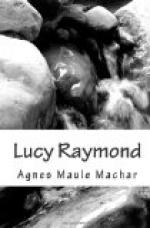The loss of Stella’s restless and vivacious presence made no small blank in the house—a blank to be still further increased by the permanent departure of Alick soon after his return from escorting Stella. He had at last decided on the place in which he was to settle—a new and rising village in the far West—and had already been claiming his mother’s promise, that so soon as he should be able to provide a home for her, she would come and preside in it. Mrs. Steele felt that it would be her duty to comply with her son’s desire; and Mr. Raymond, while very sorry to lose his sister’s kind, motherly supervision of his family, felt that he could not dissuade her from an arrangement so right and natural, and to which he had long looked forward as a probability. However, she was not to leave them for some months at least, and during that time Lucy was to learn all she could about housekeeping, in order to be able to fill her aunt’s place as well as a young beginner could do.
To Lucy, indeed, there mingled with her regret for her aunt’s expected departure, a certain latent satisfaction at the increased importance of her own place in the household; and her ambition was so much stimulated by the hope of fulfilling her new duties in the most exemplary manner, that it somewhat alleviated her sorrow at the thought of losing the kind aunt who had filled a mother’s place.
Many were the regrets when the time came for Alick’s final departure from Ashleigh to his distant sphere of duty; and Mr. Raymond, in bidding him a kind farewell, added in an earnest tone the not unneeded admonition: “Alick, my boy, don’t forget who says, ’Seek ye first the kingdom of God and His righteousness, and all other things shall be added unto you.’”
And so the happy party, who had enjoyed together at Ashleigh the pleasant summer days, were scattered, never again to meet there under the same circumstances; for the autumn, bringing the cold blasts and nipping frosts that scattered the rich summer foliage and made the earth bleak and bare, brought other changes, far sadder than these.
Nelly was the first to whose life came a sudden change. A rumour reached the village that a deck-hand on one of the river steamers had lost his life by a fatal accident, and that the man’s name was Michael Connor. It seldom happens that such reports turn out groundless; and when Mrs. Connor, having heard of it, hastened to the wharf to discover what truth there might be in it, she met a comrade of her husband’s who had come to announce to his family the sad fact.
Mrs. Connor did not profess any deep regret for a husband whom she had often asserted to be a good-for-nothing scamp. She looked at the matter chiefly in a pecuniary point of view, and, on making a rapid calculation, came to the conclusion that any deficiency caused by the loss of the small fraction of his earnings that came into her possession would be more than made up by her being relieved of the maintenance of Nelly, for whom she did not consider it her duty any longer to provide.




